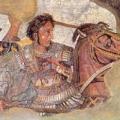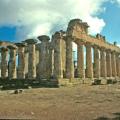53 - Beware of the Philosopher: the Cynics
Posted on
In this episode we unleash the most outrageous ancient philosophers, Diogenes and the Cynics, and their quest to “deface the currency” by exposing the hypocrisy of Greek society.
Themes:
Further Reading
• R. Bracht Branham and M.-O. Goulet-Cazé, The Cynics (London: 1996).
• W. Desmond, Cynics (Stocksfield: 2008).
• D.R. Dudley, A History of Cynicism from Diogenes to the Sixth Century AD (London: 1937).
• G. Giannantoni, Socratis et Socraticorum Reliquiae, vol.2 (Naples: 1900). [Collection of fragments and testimonies about the early Cynics.]







Comments
Cynics
Hi Peter,
I wonder if you could suggest a collection of fragments and testimonies about the Greek or Roman Cynics in English. I'd like to read their own writings or their contemporaries' writings about them if possible. I'd be interested to read either Greek or Latin fragments but I am afriad I can't read these languages directly.
Regards,
Ron
In reply to Cynics by Ron
Cynics in English
Hi Ron,
Unfortunately as far as I know that doesn't exist, though I may be wrong -- there are such volumes in French and German. Probably you're best off getting either the English version of Diogenes Laertius who is the source for much of the Cynic information anyway (D.L. is available online in English translation here). Failing that a book like Desmond's includes most of the well-known fragments in translation along the way.
Best,
Peter
In reply to Cynics in English by Peter Adamson
Diogenes Laertius
You can download an ePub version of DL here
In reply to Cynics by Ron
Cynic Texts
This is the best that I have been able to find:
https://read.amazon.com/kp/embed?asin=B009NXUQG8&asin=B009NXUQG8&previe…
Hunger and Overeating
Who was it that said something along the lines of "the discomfort of overeating is worse than being hungry"? Diogenes of Sinope?
Also, if you have the correct saying please let me know.
Thank you!
In reply to Hunger and Overeating by Jerry
Overeating
It sounds more like Epicurus, though off the top of my head I couldn't give you an exact quote. As I discuss in episode 56 though he talks about avoiding pleasures that are counterproductive from a hedonist perspective in the long run - overeating would certainly be an example.
In reply to Hunger and Overeating by Jerry
But the pleasure of
But the pleasure of overeating is better than the pleasure of hunger.
Best podcast yet...
OMG, Socrates gone wild!!! It's spring break, all year long, and Diogenes is in top form. Wow, hard to top this one.
In reply to Best podcast yet... by morgan
Cynics
Yes, this is also one of my favorite ever episodes. Though I have to admit that I can't take much credit - I basically just had to stitch together anecdotes about Diogenes!
In reply to Cynics by Peter Adamson
Diogenes
Peter,
This is a bit of a stupid question and it might be too late to ask, but I'm wondering, did Diogenes litteraly bark at passerbyes or is this just a figure of speech. All accounts I've read so far us the word "bark" but I can't figure out if that's just taking the metaphor of Diogenes the dog further or if that's litteraly true. Thanks.
In reply to Diogenes by Julian
Barking
I believe it is only a metaphor: he "barked" in the sense of saying nasty and critical things to them. At least I don't know of any reported anecdote where he literally barks, though there is one where he tries to eat raw meat in the manner of an actual dog.
Just a nitpick ... love of money quotation is not from Gospels
It is silly, but this is supposed to be a science so pedantry matters. “For the love of money is a root of all kinds of evils.” is not in Gospels, but in the Paul’s letter to Timothy (1Ti 6:10).
In reply to Just a nitpick ... love of money quotation is not from Gospels by Matěj Cepl
Not the Gospels
Ooh, well noticed. Thanks, that is just in time for me to change it for the paperback version of the book!
Crates on lust
I know this is a family podcast, but you can you say something about what Crates had in mind in saying that if all else fails, you can put an end to lust 'with a rope'?
In reply to Crates on lust by Steve
"with a rope"
Oh, nothing too salacious: he meant you can hang yourself.
In reply to "with a rope" by Peter Adamson
Thanks. I'll keep his advice
Thanks. I'll keep his advice in mind.
Add new comment